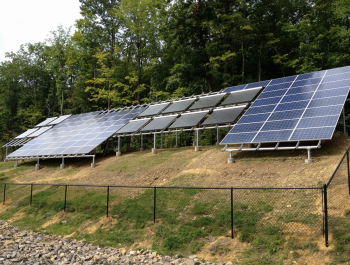Image

Linda L. Harvey, Executive Director, Laconia Area Community Land Trust
Challenge: Traditional energy sources meant high utility bills for the residents of rural Lakes Region in New Hampshire, many of whom work low-wage jobs in the tourism industry. With rent already straining many family budgets, energy efficiency had to be part of any affordable housing developments.
The mission of the Laconia Area Community Land Trust (LACLT) is to assist low- and moderate-income families to achieve economic self-sufficiency through the development of permanently affordable housing opportunities and associated support programs. LACLT serves the Greater Lakes Region in central New Hampshire, much of which is rural. The area has significant water frontage on New Hampshire’s largest lake, Lake Winnipesaukee, and on other smaller lakes. It is a resort area with a large number of expensive second homes. The Lakes Region is a popular tourist destination that hosts a multitude of hotels, inns, restaurants and shops. Most jobs in the tourism industry, which fuels the local economy, are low-wage. Many local residents have only modest economic prospects.
Our region faces a shortage of housing -- especially rental housing -- that is safe, healthy and affordable for low- and moderate-income residents. These are the working members of the our community who take care of our children, tend to our parents in nursing homes and hospitals, serve us meals, fix our cars, check us out at the grocery store and perform so many services that we depend on. To afford rent, local workers are often forced into difficult tradeoffs. Making housing payments often comes at the forfeiture of other essentials such as food, childcare, transportation and medical care.
 For 23 years, LACLT has worked to provide low- and moderate-income people with an affordable place to call home. Our ability to provide safe, healthy and affordable homes requires fiscal discipline and careful stewardship of precious resources. Keeping operating costs down at properties is critical to ensuring they stay affordable. Incorporating green building techniques helps keep operating costs low, and allows us to achieve our green development and asset management goals. LACLT’s Lochmere Meadows I is a great example of how we combine green building with affordable homes for working families in New Hampshire.
For 23 years, LACLT has worked to provide low- and moderate-income people with an affordable place to call home. Our ability to provide safe, healthy and affordable homes requires fiscal discipline and careful stewardship of precious resources. Keeping operating costs down at properties is critical to ensuring they stay affordable. Incorporating green building techniques helps keep operating costs low, and allows us to achieve our green development and asset management goals. LACLT’s Lochmere Meadows I is a great example of how we combine green building with affordable homes for working families in New Hampshire.Lochmere Meadows I consists of 28 affordable rental units. All units serve very low-income households, earning up to 50 percent of the area median income. Its location is ideal for working commuters -- just a few miles off New Hampshire’s Interstate 93, and near a high concentration of jobs in retail, restaurant and hospitality industries. There is a high demand for Lochmere Meadows units, and a standing waiting list.
The 28 units in four buildings were built as Energy Star certified homes. Unfortunately, the Lochmere development budget did not allow for the addition of any renewable energy. LACLT sought and received capital rehabilitation funding from NeighborWorks America to retrofit this property with solar hot water and solar electric. The total cost of the project was $328,733. NeighborWorks awarded grant funding in the amount of $228,733, leaving LACLT a gap to fill of $100,000. LACLT sought and received the remainder of funds needed from the TD Charitable Foundation’s Housing for Everyone grant competition.
With financial support from NeighborWorks America, LACLT built solar hot water and electric infrastructure into the Lochmere Meadows development.
The solar hot water and electric systems save residents thousands of dollars annually (relative to what they would be paying for propane systems). The clean energy produced by the Lochmere Meadows solar energy installation also offsets over 65,000 pounds of carbon dioxide pollution per year. Ultimately, by investing in renewable energy in an affordable housing development, we have saved energy and lowered operating costs.

